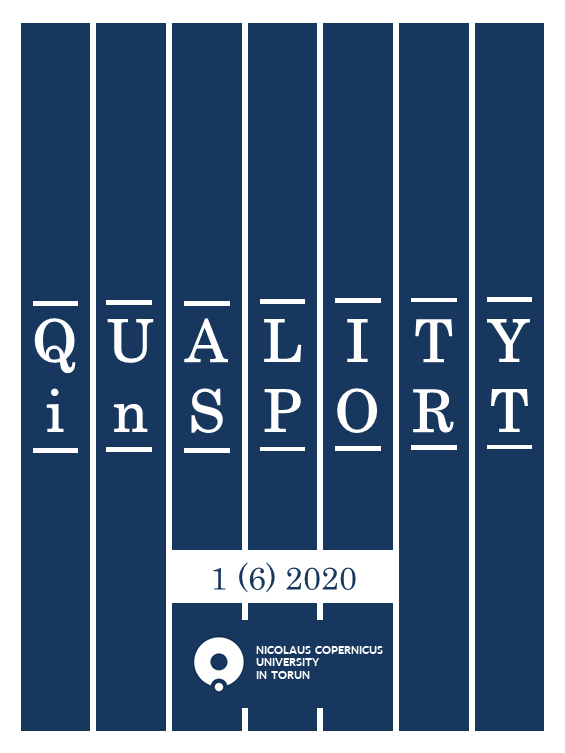Development and management of outdoor recreation: The case of Quebec
DOI:
https://doi.org/10.12775/QS.2020.002Keywords
Outdoor recreation, governance, promotion, practitioners, QuebecAbstract
Outdoor recreation is at the heart of several policies and measures with their goal being to reinforce the level of individuals’ physical activity as well as the development of communities. This is even truer in Quebec where the provincial government recently published (2017) an important note regarding the importance of outdoor recreation in the development of Quebec society. In this perspective, this study, using a quantitative approach through a survey, aims to analyze how outdoor recreation is managed and supported by the Regional County Municipalities (RCM), key actors in the territorial and social development in Quebec, and, to identify the terms and conditions for the practice of these outdoor activities in the RCMs. This study shows that there is no gap between supply and demand. However, the results reveal the importance of supporting and subsidizing promoters and outdoor organizations in Quebec while breaking into segments the pool of practitioners in order to put in place targeted communication and promotion strategies while also promoting the use of new technological information.References
Absher, J., & Mann, C. (2010). An emerging paradigm for managing protected areas with examples from Europe and the United States. International Journal of Sociology, 40(3), 86-103. doi:10.2753/IJS0020-7659400305
Bedimo-Rung, A. L., Mowen, A. J., & Cohen, D. A. (2005). The significance of parks to physical activity and public health: A conceptual model. American Journal of Preventive Medicine, 28(2), 159-168. doi: 10.1016/j.amepre.2004.10.024
Besenyi, G. M., Fair, M., Hughey, S. M., Kaczynski, A. T., Powers, A., & Dunlap, E. (2015). Park Hop: Pilot evaluation of an inter-agency collaboration to promote park awareness, visitation, and physical activity in Greenville County, SC. Journal of Park & Recreation Administration, 33(4), 69-89.
Branget, B. Auger, D., & St-Laurent, M. (2018). 40 ans de recherche en plein air : évolution et tendance. Loisir et Société / Society and Leisure, 41(1), 105-129.
Chaffin, B. C., & Gosnell, H. (2015). Measuring success of adaptive management projects. In C. R. Allen & A. S. Garmestani (Eds.), Adaptive management of social-ecological systems (pp. 85-105). New York: Springer.
Eagles, P. F. (2009). Governance of recreation and tourism partnerships in parks and protected areas. Journal of sustainable tourism, 17(2), 231-248.
Francois, H., Hirczak, M., & Senil, N. (2006). Territoire et patrimoine : la co-construction d’une dynamique et de ses ressources. Revue d’Économie Régionale & Urbaine, (5), 683–700.
Garneau, J. (2017). Les rôles et les tâches des acteurs impliqués dans une entente de coopération intermunicipale pour le loisir en milieu rural au Québec. (Maître ès arts), Université du Québec à Trois-Rivières, Trois-Rivières.
Krieger, S.-J., Deldrève, V., & Lewis, N. (2017). Écologisation des loisirs de nature, entre ensauvagèrent et domestication. Loisir et Société/Society and Leisure, 40(1), 25–38.
Larue, P., & Bélec, P. (2016). Le Québec en plein air. Montréal : Éditions Québec Amérique.
Lepillé, R., Évrard, B., Bussi, M., & Féménias, D. (2017). Formes de marche et immersions dans la nature ressourcements et dépaysements dans les forêts urbaines. Loisir et Société, 40(1), 113–136.
Ministère de l’Éducation et de l’Enseignement supérieur (MEES). (2017). Au Québec, on bouge en plein air – Avis sur le plein air. Québec, Québec : Gouvernement du Québec.
Moyle, B. D., Scherrer, P., Weiler, B., Wilson, E., Caldicott, R., & Nielsen, N. (2017). Assessing preferences of potential visitors for nature-based experiences in protected areas. Tourism Management, 62, 29-41.
Newsome, D. (2014). Appropriate policy development and research needs in response to adventure racing in protected areas. Biological Conservation, 171, 259-269. doi:10.1016/j.biocon.2014.01.008
Pickering, C., Rossi, S. D., Hernando, A., & Barros, A. (2018). Current knowledge and future research directions for the monitoring and management of visitors in recreational and protected areas. Journal of Outdoor Recreation and Tourism, 21, 10-18. doi: https://doi.org/10.1016/j.jort.2017.11.002
Reigner, N., Lawson, S., Meldrum, B., Pettebone, D., Newman, P., Gibson, A., & Kiser, B. (2012). Adaptive management of visitor use on half dome, an example of effectiveness. Journal of Park & Recreation Administration, 30(3), 64-78.
Spenceley, A., Snyman, S., & Eagles, P. F. J. (2019). A decision framework on the choice of management models for park and protected area tourism services. Journal of Outdoor Recreation and Tourism, 26, 72-80. doi: https://doi.org/10.1016/j.jort.2019.03.004
Tarrant, M. A. & Smith, E. K. (2002). The use of a modified importance performance framework to examine visitor satisfaction with attributes of outdoor recreation settings. Managing Leisure, 7(2), 69-82, DOI: 10.1080/13606710210137246
Tomczyk, A. M., & Ewertowski, M. (2013). Planning of recreational trails in protected areas: Application of regression tree analysis and geographic information systems. Applied Geography, 40, 129-139. doi:10.1016/j.apgeog.2013.02.004
Transat, C. d. T. (2015). Analyse des meilleures pratiques de mise en marché et de promotion des destinations de cyclotourisme. Rapport de recherche.
Žugić, J., Gojović, I., & Perazić, M. (2015). Strategic approach to the promotion of protected areas. Agriculture & Forestry / Poljoprivreda i Sumarstvo, 61(3), 87-100. doi:10.17707/AgricultForest.61.3.09
Downloads
Published
How to Cite
Issue
Section
Stats
Number of views and downloads: 422
Number of citations: 0



